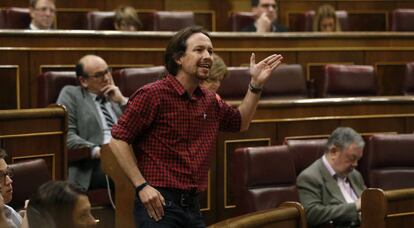Podemos uses last days of Congress to present media policies
Anti-austerity group calls for greater “independence” of state-funded entities


With just days to go before a repeat general election is called in Spain for June 26 and Congress dissolved, on Friday anti-austerity party Podemos presented three non-legislative motions.
The motions will not be debated, and Podemos has released few details other than that one of the measures relates to the state-funded EFE news agency. The other two address use of the radio spectrum and the so-called third sector of the media: not-for-profit organizations.
The party briefly outlined its proposals for EFE in February in the wake of the inconclusive December 20 elections, during talks to form a coalition government with the Socialist Party (PSOE). It presented a document entitled Political bases for a stable government with guarantees, calling for measures to end what it called “government control” over the news agency – along the lines of those it wants to establish for state broadcaster RTVE to guarantee “independence, participation and transparency”.
Podemos also wants “transparent” management of the radio spectrum “on a par with European standards”
Podemos also wants “transparent” management of the radio spectrum, “on a par with European standards for the adjudication of concessions based on pluralist criteria.” The party’s electoral program calls for a “balanced division of the radio spectrum as a common good, avoiding media concentration.”
The party also presented an initiative dealing with community media, calling for “compliance with current audiovisual legislation related to the third sector of the communication sector (not-for-profit community media), whose democratizing and galvanizing role should be encouraged and protected, as happens in the rest of Europe, following the recommendations outlined by UNESCO.”
English version by Nick Lyne.
Sign up for our newsletter
EL PAÍS English Edition is launching a weekly newsletter. Sign up today to receive a selection of our best stories in your inbox every Saturday morning. For full details about how to subscribe, click here.
Tu suscripción se está usando en otro dispositivo
¿Quieres añadir otro usuario a tu suscripción?
Si continúas leyendo en este dispositivo, no se podrá leer en el otro.
FlechaTu suscripción se está usando en otro dispositivo y solo puedes acceder a EL PAÍS desde un dispositivo a la vez.
Si quieres compartir tu cuenta, cambia tu suscripción a la modalidad Premium, así podrás añadir otro usuario. Cada uno accederá con su propia cuenta de email, lo que os permitirá personalizar vuestra experiencia en EL PAÍS.
¿Tienes una suscripción de empresa? Accede aquí para contratar más cuentas.
En el caso de no saber quién está usando tu cuenta, te recomendamos cambiar tu contraseña aquí.
Si decides continuar compartiendo tu cuenta, este mensaje se mostrará en tu dispositivo y en el de la otra persona que está usando tu cuenta de forma indefinida, afectando a tu experiencia de lectura. Puedes consultar aquí los términos y condiciones de la suscripción digital.








































